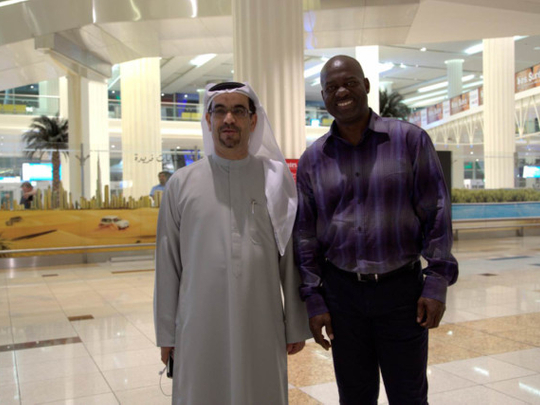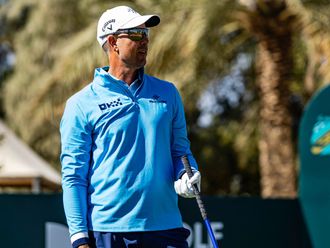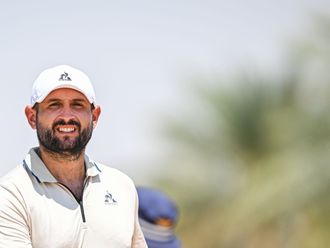
Dubai: Perhaps one of the most detested sportsmen in the late 1980s after he tested positive for anabolic steroids following his 100 metres victory at the Olympic Games in 1988, Canadian sprinter Ben Johnson is in Dubai this week advocating a healthy and drug-free pursuit of sport.
Joining the former sprinter at the Fourth International Conference on Sport Versus Crime to be held under the theme ‘Sport without Crime’ at the Rayhaan Rotana Hotel, Deira from November 25-27 will be football legend Diego Maradona.
The three-day event is being held under the patronage of Shaikh Hamdan Bin Mohammad Bin Rashid Al Maktoum, Crown Prince of Dubai and Chairman, Dubai Sports Council (DSC), with support from Al Futtaim (official sponsor), Dodsal (Platinum sponsor), Eazeebiz (sponsorship partner) and Medialand (main event organiser). Gulf News interviewed Johnson exclusively on Friday ahead of the conference.
GULF NEWS: What do you think was the highlight of your career?
BEN JOHNSON: In my mind when I look back at my career, I remember all the hard work that I put in along with the great accomplishments that came along. I also remember the travelling to distant parts of the world and meeting a lot of people. My passion was to run and that gave me everything.
Q. What was it like running against a generation of stars that included Carl Lewis?
A. It was a great rivalry with both of us bringing out the best from each other. We both wanted to be winners. We both wanted to be number one. We both wanted to entertain the crowd and both of us did the best we could during that period.
Q. What powers Usain Bolt? What is it that makes him what he is today?
A. He belongs to a new generation of runners and that is the first difference. When I was running, he was only three years old. He’s got better technology now and the people he’s got to run against now are great, but they are not fast enough to beat him. When he is running at 60 metres, the rest of the runners are already decelerating. So that makes it much easier for him to win [in] the last 40 metres.
Q. Do you feel Bolt can go any faster?
A. If at all he wants to run faster, then he’s got to do it next year or the year after as this is his prime. After that, his body will start shutting down by [the age of] 29 or 30. I’ve been there, so I know.
Q. Do you think Bolt can be vulnerable at any time during a race?
A. As I explained to you earlier, I think he can be vulnerable between 60 and 40 metres, but then other people are decelerating at that point and things are easy for Bolt.
Q. What does his success come down to? Is it technique or is it evolution of equipment or something else?
A. There are a whole load of factors that gives him success. It’s a combination of developed technology, better shoes, better track conditions and, of course, a different generation.
Q. Do you feel you got a fair second chance or you got a raw deal from everyone after you were tested positive for drugs?
A. I was at the wrong place at the wrong time.
Q. Do you have any regrets?
A. Well, I do have some regrets. You have to understand that I did what I did and I said yes to what I did by just trying to please people in my camp starting with my coach the late Charlie Francis. He told me that most of the people I was competing against were using performance-enhancing substances and that I too should follow. I was convinced.
Q. Do you think the World Anti-Doping Authority Wada’s recent increase in a ban for taking performance-enhancing drugs from two years to four is fair enough?
A. I just heard on the news that the ban has been increased from two years to four years. That’s fair enough and I think it is a term enough to finish any career in track and field. Four years is a long time.
Q. Do you think Bolt is clean?
A. It’s not for me to say. I can’t say that.
Q. Do you wish you could have the support of other top athletes in your campaign?
A. Yes, it would definitely help to have more voices to this campaign. I’ve asked Carl Lewis to be part of it. In fact, I’ve challenged him, but he has not replied. I guess he is a coward. He should have come out.
Q. If you were to meet kids today and talk to them about doping et cetera, do you think they would take you seriously?
A. I am in a position to speak and that is what I will continue doing all my life. I am honest in what I am doing. So I don’t know why they should not be listening to what I have to say. If I failed, then that would be a shame. But at least I would have tried. What I would tell the kids is that they can use their bodies to set an example and make a career in sports.
Q. How important is it for you to be here?
A. I’ve been here a few times already. It means a lot to be part of this and what they are trying to achieve. We have at least 25 countries involved in this campaign and it’s a great achievement to see us going so far with the Skins [the Switzerland-based compression clothing company supporting Johnson’s anti-drugs crusade] campaign. It’s a great honour to be here.










